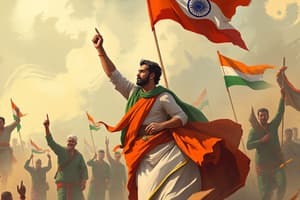Podcast
Questions and Answers
What significant event took place in 1885 related to India's freedom struggle?
What significant event took place in 1885 related to India's freedom struggle?
- Establishment of the Indian Association
- Formation of the National Conference
- Formation of the Indian Reform Society
- Founding of the Indian National Congress (correct)
Which ideology did the 'Moderates' in the Indian National Congress primarily support?
Which ideology did the 'Moderates' in the Indian National Congress primarily support?
- Seeking gradual reforms through dialogue (correct)
- Complete boycott of all British goods
- Radical nationalism and civil disobedience
- Immediate complete independence
What was a significant outcome of the Partition of Bengal in 1905?
What was a significant outcome of the Partition of Bengal in 1905?
- Strengthening of British control over India
- Formation of the Indian Reform Society
- Increased unity among Indian nationalists (correct)
- Establishment of the Public Service Commission
Who was NOT a prominent figure in the Swadeshi Movement?
Who was NOT a prominent figure in the Swadeshi Movement?
What was the primary focus of the Swadeshi Movement launched in 1905?
What was the primary focus of the Swadeshi Movement launched in 1905?
Which event marked significant repression against Indian nationalists?
Which event marked significant repression against Indian nationalists?
In what year was the Indian Association established?
In what year was the Indian Association established?
Who led the National Conference formed in 1883?
Who led the National Conference formed in 1883?
Flashcards are hidden until you start studying
Study Notes
Early Resistance (1870s-1880s)
- The Indian Association was established in 1876 by Suresh Chandra Banerjee to promote Indian interests.
- The National Conference, led by Surendra Nath Banerjea, was formed in 1883 to address political issues and strengthen the voice of Indians.
- The Indian National Congress (INC) was established in 1885 and began efforts to unify Indians in voicing concerns to British authorities.
- The Public Service Commission was created in 1886 to address injustices in the civil service system.
- Dadabhai Naoroji, a prominent leader and economist, established the Indian Reform Society in England to advocate for Indian rights and reform British policies.
Shifting Strategies (1887-1905)
- Increased British repression, a hardened stance against Indian nationalists, led to growing unrest.
- The INC experienced internal clashes between moderate leaders, like Dadabhai Naoroji and Gopal Krishna Gokhale, advocating for gradual reform, and extremists like Bal Gangadhar Tilak and Bipin Chandra Pal, who demanded swifter action against British rule.
- The partition of Bengal in 1905, a divisive decision aimed at weakening Bengali unity and consolidating British control, provoked strong opposition and led to the Swadeshi Movement.
The Swadeshi Movement (1905-1919)
- Launched in Calcutta on August 7, 1905, the Swadeshi Movement was a form of economic nationalism with a strong emphasis on self-reliance and boycott of British goods.
- It was led by figures like Arvind Ghosh, Lokmanya Bal Gangadhar Tilak, Bipin Chandra Pal, and Lala Lajpat Rai, who encouraged Indians to embrace Indian products and promote local industries.
- The movement met with criticism, particularly from moderate leaders, for being too focused on self-interest and not emphasizing broader, inclusive political change.
Timeline and Key Figures
- Dadabhai Naoroji was elected to the British House of Commons in 1892, becoming the first Indian to hold a seat in the British parliament.
- The proposal for the Partition of Bengal emerged in 1903, dividing the province and leading to widespread resistance.
- The official announcement of the Bengal Partition took place in 1905, sparking widespread opposition and the Swadeshi Movement.
- The period between 1905 and 1919 witnessed a surge in political debates and movements throughout India, driven by the desire for greater autonomy and self-governance.
- Extremism within the Indian National Congress grew during this time, with leaders becoming more vocal in their calls for independence.
Studying That Suits You
Use AI to generate personalized quizzes and flashcards to suit your learning preferences.




